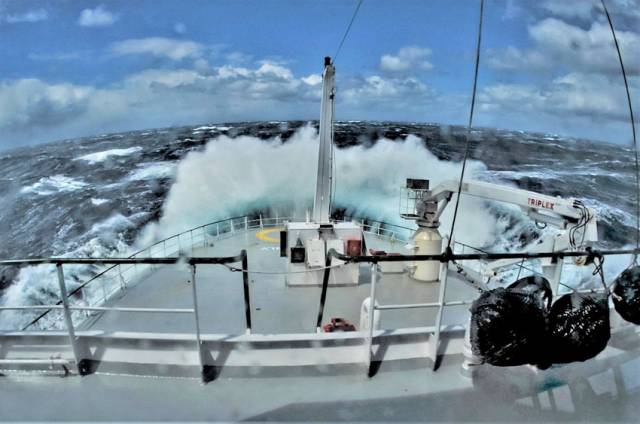#ClimateChange - Preliminary results from the recent ‘health check’ of the Atlantic Ocean suggest a greater penetration of manmade chlorofluorocarbons (CFCs) further into the deeper ocean since 20 years ago.
As previously reported on Afloat.ie, an Irish-led international team of marine scientists from six countries set out from Newfoundland on 27 April on board the RV Celtic Explorer, to survey a transect of the Atlantic last measured two decades ago and investigate the impact of climate change on the deep ocean.
Explaining the team’s findings, Dr Evin McGovern of the Marine Institute and principal investigator on the GO-SHIP A02 survey said: “Although these chemicals have been phased out, they remain in the atmosphere and enter the ocean, where over time, they travel to the deep ocean.
“We measure the CFCs to tell the age of the water masses in the deep ocean and this helps us assess the uptake of fossil fuel carbon from the atmosphere and penetration into the deep ocean.”
The survey formed part of the Global Oceans Ship-Based Hydrographic Investigations Programme (GO-SHIP), which carries out systematic and global surveys of select hydrographic sections, through an international consortium of 16 countries and laboratories.
This was the first GO-SHIP survey to involve such a level of collaboration, with scientists from 10 leading universities and research institutes representing six countries.
Canadian Ambassador to Ireland Kevin Vickers visited the RV Celtic Explorer to meet the team in Galway following their arrival on Monday 22 May.
“This survey is a wonderful example of the Galway Statement in action as well as the longstanding collaboration on marine research between Ireland and Canada,” he said.
Marine Institute chief executive Dr Peter Heffernan added that the expedition’s scientists “are contributing to addressing some of the biggest questions for society and our interaction with our planet.”
Find out more about the survey on the Scientists@Sea blog, where the GO-SHIP team aboard the RV Celtic Explorer recorded their work and experiences.
































































